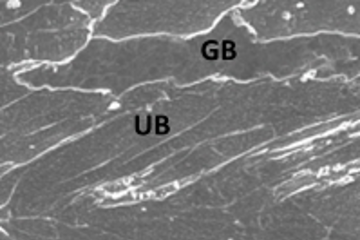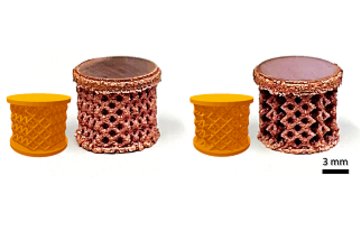All genres
421.
Journal Article
Behavior of molecules and molecular ions near a field emitter. New Journal of Physics 18, 033031 (2016)
422.
Journal Article
Insights into microstructural interfaces in aerospace alloys characterised by atom probe tomography. Materials Science and Technology 32 (3), pp. 232 - 241 (2016)
423.
Journal Article
Mining information from atom probe data. Ultramicroscopy 159, pp. 324 - 337 (2015)
424.
Journal Article
The rise of computational techniques in atom probe microscopy. Current Opinion in Solid State and Materials Science 17 (5), pp. 224 - 235 (2013)
425.
Book
Hydrogen-induced damage in Ni-based superalloys at high temperatures. (2025)
426.
Conference Paper
Effect of nanoparticle additivation on the microstructure and microhardness of oxide dispersion strengthened steels produced by laser powder bed fusion and directed energy deposition. 11th CIRP Conference on Photonic Technologies [LANE 2020], virtuel edition, September 07, 2020 - September 10, 2020. Procedia CIRP 94, pp. 41 - 45 (2020)
427.
Conference Paper
Atomic Structure and Chemical Composition of Planar Fault Structures in Co-Base Superalloys. 14th International Symposium on Superalloys, Superalloys 2021, Seven Springs, PA, USA, September 12, 2021 - September 16, 2021. Minerals, Metals and Materials Series, pp. 920 - 928 (2020)
428.
Conference Paper
Grain boundary segregation and precipitation in an Al–Zn–Mg–Cu alloy. In: edp Sciences, MATEC Web of Conferences, Section Plenary Lecture & ECR Award Recipients, Vol. 326, 01004. The 17th International Conference on Aluminium Alloys 2020 (ICAA17) , Grenoble, France, October 26, 2020 - October 29, 2020. (2020)
429.
Conference Paper
Application of Atom Probe Tomography to Complex Microstructures of Laser Additively Manufactured Samples. Microscopy and Microanalysis 25, S2 Ed., pp. 2514 - 2515 (2019)
430.
Conference Paper
Deformation of Borides in Nickel-based Superalloys: a Study of Segregation at Dislocations. M & M 2019 - Microscopy & Microanalysis, Portland, OR, USA, August 04, 2019 - August 08, 2019. Microscopy and Microanalysis 25, S2 Ed., pp. 2538 - 2539 (2019)
431.
Conference Paper
Understanding the Role of Cu and Clustering on Strain Hardening and Strain Rate Sensitivity of Al–Mg–Si–Cu Alloys. In: The Minerals, Metals & Materials Series (MMMS), pp. 143 - 151 (Ed. Chesonis, C.). Springer, Cham (2019)
432.
Conference Paper
OFrac: An advanced nanostructured ferritic alloy fuel cladding for fast reactors. AISTech 2018 Iron and Steel Technology Conference and Exposition, Pennsylvania Convention Center, Philadelphia, PA, USA, May 07, 2018 - May 10, 2018. AISTech - Iron and Steel Technology Conference Proceedings 2018-May, pp. 1433 - 1435 (2018)
433.
Conference Paper
Ofrac: An advanced nanostructured ferritic alloy fuel cladding for fast reactors. 2018 Transactions of the American Nuclear Society, ANS 2018 and Embedded Topical Meeting Nuclear Fuels and Structural Materials, Marriott Philadelphia Downtown, Philadelphia, PA; USA, June 17, 2018 - June 21, 2018. Transactions of the American Nuclear Society 118, pp. 1433 - 1435 (2018)
434.
Conference Paper
Improved Atom Probe Methodology for Studying Carbon Redistribution in Low-Carbon High-Ms Lath Martensitic Steels. In: Microscopy & Microanalysis 2017, Vol. 23, pp. 706 - 707. Microscopy & Microanalysis 2017, St. Louis, Missouri, USA, August 06, 2017 - August 10, 2017. Cambridge University Press, Cambridge, UK (2017)
435.
Conference Paper
High Fidelity Reconstruction of Experimental Field Ion Microscopy Data by Atomic Relaxation Simulations. In: Proceedings of Microscopy & Microanaalysis 2017, Vol. 23, pp. 642 - 643. Microscopy and Microanalysis 2017, St. Louis, MO, USA, August 06, 2017 - August 10, 2017. Cambridge University Press, New York, NY, USA (2017)
436.
Conference Paper
Atomistic Simulations of Surface Effects Under High Electric Fields. In: Proceedings of Microscopy & Microanalysis 2017, Vol. 23, pp. 644 - 645. Microscopy & Microanalysis 2017, St. Louis, Missouri, USA, August 06, 2017 - August 10, 2017. (2017)
437.
Conference Paper
On the Multiple Event Detection in Atom Probe Tomography. In: MicroscopyMicroanalysis, Vol. 23, pp. 618 - 619. Microscopy & Microanalysis 2017, St. Louis, MO, USA, August 06, 2017 - August 10, 2017. (2017)
438.
Conference Paper
A Methodology for Investigation of Grain-Boundary Diffusion and Segregation. In: MicroscopyMicroanalysis, Vol. 23, pp. 656 - 657. Microscopy & Microanalysis 2017, St. Louis, MO, USA, August 06, 2017 - August 10, 2017. (2017)
439.
Conference Paper
Degradation Mechanism of Molds for Precision Glass Molding. In: MicroscopyMicroanalysis, Vol. 23, pp. 698 - 699. Microscopy & Microanalysis 2017, St. Louis, MO, USA, August 06, 2017 - August 10, 2017. (2017)
440.
Conference Paper
Topological Impurity Segregation at Faceted Silicon Grain Boundaries Studied by Correlative Atomic-Resolution STEM and APT. In: Microscopy and Microanalysis, Vol. 22, pp. 46 - 47. 3rd Conference on In Situ and Correlative Electron Microscopy (CISCEM 2016) , Saarbrücken, Germany, October 11, 2016 - October 12, 2016. (2016)











